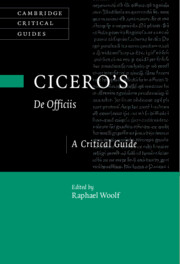Refine search
Actions for selected content:
14 results
Chapter 1 - Passion and Persuasion
-
- Book:
- Protestant Bodies
- Published online:
- 20 February 2025
- Print publication:
- 27 February 2025, pp 38-82
-
- Chapter
- Export citation
Chapter Two - Nakedness and the Lascivious
- from Part I
-
- Book:
- Reforming Art in Renaissance Venice
- Published online:
- 24 January 2025
- Print publication:
- 13 February 2025, pp 79-134
-
- Chapter
- Export citation
8 - Care of the (Written) Self
- from Part IV - Self and Society
-
-
- Book:
- Cicero's ‘De Officiis'
- Published online:
- 15 June 2023
- Print publication:
- 29 June 2023, pp 163-181
-
- Chapter
- Export citation
9 - Cicero and the Cynics
- from Part IV - Self and Society
-
-
- Book:
- Cicero's ‘De Officiis'
- Published online:
- 15 June 2023
- Print publication:
- 29 June 2023, pp 182-200
-
- Chapter
- Export citation

Cicero's ‘De Officiis'
- A Critical Guide
-
- Published online:
- 15 June 2023
- Print publication:
- 29 June 2023
Chapter 4 - Nos in diem vivimus
- from Part I - Techniques and Tactics of Ciceronian Philosophy
-
-
- Book:
- Power and Persuasion in Cicero's Philosophy
- Published online:
- 15 January 2023
- Print publication:
- 05 January 2023, pp 77-96
-
- Chapter
- Export citation
Chapter 4 - An Economy of Goodwill
- from Part I - The Practice of Voluntas
-
- Book:
- Cicero and the People’s Will
- Published online:
- 24 November 2022
- Print publication:
- 08 December 2022, pp 79-104
-
- Chapter
- Export citation
Chapter 8 - The Fourfold Self
- from Part II - The Philosophy of Voluntas
-
- Book:
- Cicero and the People’s Will
- Published online:
- 24 November 2022
- Print publication:
- 08 December 2022, pp 186-217
-
- Chapter
- Export citation
Chapter 10 - Andrew Marvell’s Taste for Death
- from Part III - The Ends of Commemoration
-
-
- Book:
- Memory and Mortality in Renaissance England
- Published online:
- 06 October 2022
- Print publication:
- 13 October 2022, pp 201-217
-
- Chapter
- Export citation
Chapter Three - Margaret Cavendish and the Rhetoric and Aesthetics of the Microscopic Image in Seventeenth-Century England
- from Part I - History of Science
-
-
- Book:
- Margaret Cavendish
- Published online:
- 28 April 2022
- Print publication:
- 12 May 2022, pp 51-68
-
- Chapter
- Export citation
1 - “I Tremble with My Whole Heart”
- from PART I - Eloquence and the Ancients
-
- Book:
- Words on Fire
- Published online:
- 16 December 2021
- Print publication:
- 16 December 2021, pp 23-50
-
- Chapter
- Export citation
2 - The Parthenon and the Outhouse
- from PART I - Eloquence and the Ancients
-
- Book:
- Words on Fire
- Published online:
- 16 December 2021
- Print publication:
- 16 December 2021, pp 51-77
-
- Chapter
- Export citation
Chapter 13 - Philosophy, Rhetoric, and Politics
-
-
- Book:
- The Cambridge Companion to Cicero's Philosophy
- Published online:
- 08 December 2021
- Print publication:
- 16 December 2021, pp 200-214
-
- Chapter
- Export citation
Chapter 4 - King Lear
-
- Book:
- Criticism, Performance, and the Passions in the Eighteenth Century
- Published online:
- 02 March 2021
- Print publication:
- 18 March 2021, pp 116-152
-
- Chapter
- Export citation
